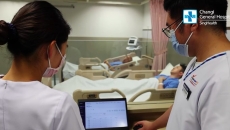Artificial Intelligence
Progress has been made with artificial intelligence and machine learning in healthcare, says Kathy Ford, chief product and strategy officer at Project Ronin, who notes that some stakeholders are still risk-averse.
The new institute will focus on AI and machine learning, virtual and augmented reality, 5G technologies, precision medicine, telehealth and more.
The two-year study uses predictive models, developed for skin cancer diagnosis, to help detect eczema and enable the prevention of future allergies and diseases.
It is part of the hospital's smart remote health monitoring system project with A*STAR spinoff Respiree.
Kami Vision develops artificial intelligence-based fall-detection technology for elder care, using home cameras to detect when a fall occurs and then notifying concerned parties. Yamin Durrani, the company's CEO, explains more.
The collaboration builds on clinical research using Numares' machine-driven metabolic diagnostics to enhance care for patients with chronic diseases.
The AI-driven software, developed to identify heart disease, now automates the secure upload of CCTA scans and can receive images from multiple modalities and systems.
Investment in the AI platform on Microsoft Azure could accelerate multimodal data analysis and performance – and ultimately improve patient outcomes.
The health system has been able to do 7% more surgical cases despite having to close 20% of its ORs at times. The organization now is meeting or exceeding budgeted volumes.
Virtual therapeutics, voice recognition and fast-evolving artificial intelligence tools are transforming home-based care, says Robin Farmanfarmaian, co-author of the new book How AI Can Democratize Healthcare.









